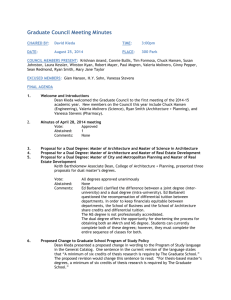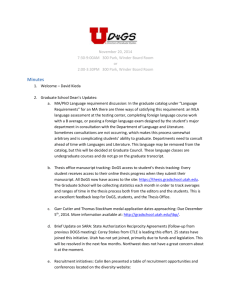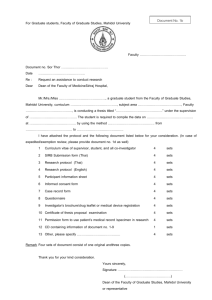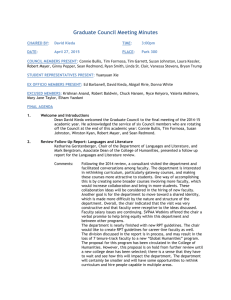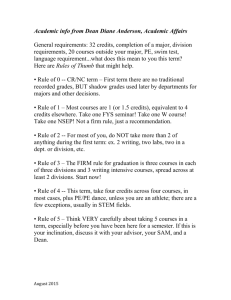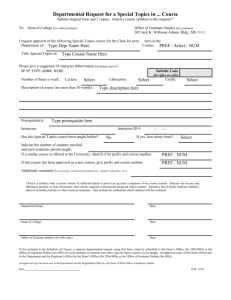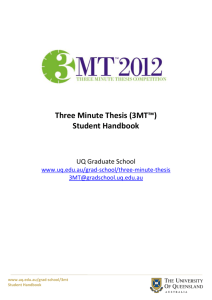DOGS-Minutes-08.28.2014 - Graduate School
advertisement
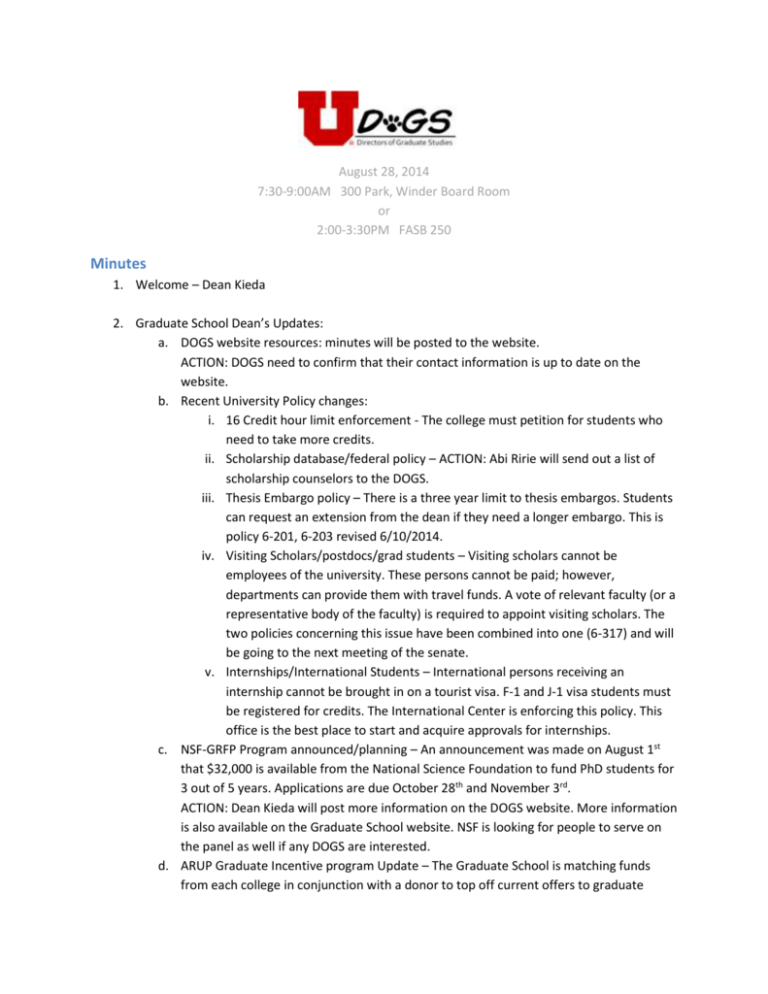
August 28, 2014 7:30-9:00AM 300 Park, Winder Board Room or 2:00-3:30PM FASB 250 Minutes 1. Welcome – Dean Kieda 2. Graduate School Dean’s Updates: a. DOGS website resources: minutes will be posted to the website. ACTION: DOGS need to confirm that their contact information is up to date on the website. b. Recent University Policy changes: i. 16 Credit hour limit enforcement - The college must petition for students who need to take more credits. ii. Scholarship database/federal policy – ACTION: Abi Ririe will send out a list of scholarship counselors to the DOGS. iii. Thesis Embargo policy – There is a three year limit to thesis embargos. Students can request an extension from the dean if they need a longer embargo. This is policy 6-201, 6-203 revised 6/10/2014. iv. Visiting Scholars/postdocs/grad students – Visiting scholars cannot be employees of the university. These persons cannot be paid; however, departments can provide them with travel funds. A vote of relevant faculty (or a representative body of the faculty) is required to appoint visiting scholars. The two policies concerning this issue have been combined into one (6-317) and will be going to the next meeting of the senate. v. Internships/International Students – International persons receiving an internship cannot be brought in on a tourist visa. F-1 and J-1 visa students must be registered for credits. The International Center is enforcing this policy. This office is the best place to start and acquire approvals for internships. c. NSF-GRFP Program announced/planning – An announcement was made on August 1st that $32,000 is available from the National Science Foundation to fund PhD students for 3 out of 5 years. Applications are due October 28th and November 3rd. ACTION: Dean Kieda will post more information on the DOGS website. More information is also available on the Graduate School website. NSF is looking for people to serve on the panel as well if any DOGS are interested. d. ARUP Graduate Incentive program Update – The Graduate School is matching funds from each college in conjunction with a donor to top off current offers to graduate 3. 4. 5. 6. students. 4 colleges have participated, but the Graduate School is still waiting on others to take advantage of this opportunity. ACTION: Dean Kieda will post this information to the DOGS website and email it to the DOGS list. Funding / Tuition Benefit Process – Jolyn Schleiffarth Graduate fellows income counts toward the cost of education and tuition payments. ACTION: Dean Kieda will check with the scholarship office to see if a GRF can be paid through payroll instead of awarded as financial aid. There is no cap on the student insurance benefit. The rate has gone up, and is now posted on the graduate school website. A prescription benefit has been added. International students are automatically enrolled unless they sign a waiver. Departments need to reduce late overrides from coordinators. These need to be submitted within two weeks of the end of the semester. ACTION: Jolyn will email out flyers/references. Thesis Approval Process – Kelly Harward All students need to read the handbook before they start writing! (An updated copy will be available online soon.) A preliminary review of manuscripts is STRONGLY encouraged. Large manuscripts (over 200 pages) have a deadline one week before the standard deadline. Thesis information is available on the website. A request was made to open thesis boot camps to masters students. A question was raised about a list of professional editors who might be available for students. The thesis office will look into this possibility. 3MT – Tracy Rees, Francine Mahak Career Services Donna White will be serving as a judge for the first 3MT competition in November. Two more faculty members are needed to judge. A website will be in place in December. ACTION: Tracy Rees will send a pdf of the 3MT flyer to the DOGS. At this point theses, dissertations, and independent research projects are able to present. For year one master’s students can participate at the University of Utah level. Open Forum a. A Spring ITA workshop will occur next semester. Late arrivals or those who encountered Visa issues can register for spring. Diane Cotsonas and Dean Kieda will strategize this fall about how to support more students in terms of resources and personnel. b. Question on tuition benefit program: Students who received their masters from the University of Utah are eligible to receive 6 semesters of support as a doctoral student. Students who received their masters elsewhere are eligible to receive 8. ACTION: Dean Kieda will talk to some former deans and research the history of this policy and why it is in place. POST MEETING REMARK: Students with masters from the University of Utah are eligible for two additional semesters tuition benefit if they have TA’d for two years. Students with a masters from another university are not eligible. Therefore both are able to allow up to eight semesters tuition benefit. c. FERPA guidelines were handed out. FERPA certification is mandatory. d. During spring semester there was a discussion certificate programs and the relationship between certificates and degrees. Can these credits be double counted? ACTION: Dean Kieda will find a policy related to this topic, clarify, and post the information. POST MEETING REMARK: The only restriction on counted certificate credits occurs if the student is non-matriculated into their graduate program when they earn the certificate. The limit of the number of credits allowable as a nonmatriculated student then applies. e. A question was brought up about graduate enrollment statistics. Dean Kieda said that admissions are up by 2%, applications are up by 15%, and the number of degrees awarded is up by 5%. The biggest growth is in business (MBA).
